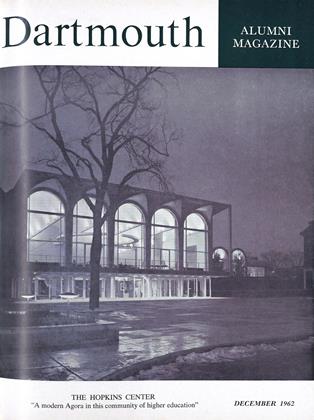Edited by Gerald Jay Goldberg andNancy Marmer Goldberg. EnglewoodCliffs, N. J.: Prentice-Hall, Inc., 1962.xvii + 344 pp. $6.95.
In this anthology of writings by leading British and American critics of this century - mostly essays, but a few chapters excerpted from books - the chief aim of the editors has been to illustrate those varieties or "schools" of literary criticism most prominent during the past fifty years. After a brief introduction contributed by Professor William Van O'Connor, each of the eight sections of the book is devoted to one of these varieties. The first essay in each section is regarded by the editors as exemplary of the "theory" of a species of criticism; the following items in the section, ranging in number from one to eight, illustrate the "uses" of the species. In all, twenty-nine selections are anthologized.
The longest of the sections is the first, assigned to "The Uses of Formal Analysis." Under this rubric appears such a representative of the "New Criticism" (the name is hardly any longer apposite) as Cleanth Brooks. Whether all the others represented here - Blackmur, Burke, Ransom, Tate and Empson, among others - would accept the encomium (or impeachment) of being "New" is open to question, but as here presented, they belong where the editors have put them. Next comes "The Uses of the Socio-Cultural Milieu"; here, naturally, one finds, among others, Edmund Wilson and Trilling. The remaining sections are shorter. "The Uses of Tradition" are exemplified by T. S. Eliot (three selections) and Leavis; "The Uses of Biography" by Tillyard and Matthiessen; "The Uses of Humanism" by Bush and Babbitt; "The Uses of Scholarship" by Woodhouse and Martz; "The Uses of Psychology" by Herbert Read, Ernst Kris (Freudian) and Maud Bodkin (mostly Jungian); and finally, "The Uses of Myth" by Wheelwright and R. W. B. Lewis.
Beside the merit of this book's general plan, it possesses several subsidiary merits. For one thing, the editors have achieved an unusual amount of interplay among their selections. There has recently been (and it has not entirely subsided) a lively controversy among scholars and critics over the standing of Milton as an epic poet. In this anthology, the two essays on Milton by T. S. Eliot - the latter one representing almost an about-face - and the essay by A. S. P. Woodhouse enable a reader to survey the outlines of this controversy from several points of view. Another merit of the collection is the high general level of intrinsic interest and stylistic attractiveness manifest in the anthologized authors. To be commended also is the editors' avoidance of mere snippets of a page or two - a phenomenon frequently encountered because of some anthologist's desire to give at least one vote to every distinguishable point of view.
Picking up another recently published and widely used anthology of contemporary criticism Irving Howe's Modern LiteraryCriticism - one notes that Professor and Mrs. Goldberg have, without any sign of being incommoded, managed to avoid duplication of any selection in Howe's book. Indeed, their stressing of varieties of criticism in arranging their book makes it the better pedagogical implement of the two, without entailing any lapse into textbookishness. Inevitably, in using any book of this kind, a particular reader will regret the omission of this or that item desirable either to complete the scheme of the book, or to add lustre to its contents. The present reviewer would like to see a Chicago Neo-Aristotelian - an analyst of structure rather than texture added to "The Uses of Tradition"; and he deprecates the absence of Northrop Frye, our most brilliant writer of contemporary criticism, who would probably appear under "The Uses of Myth." However, the Goldbergs' anthology is the best recent anthology of contemporary criticism known to this reviewer.
F. CUDWORTH FLINT
-
 Books
BooksSADDLING PEGASUS
JANUARY 1932 By F. Cudworth Flint -
 Books
BooksBEAU-POIL AU MAROC
June 1940 By F. Cudworth Flint -
 Books
BooksSPARROW HAWKS
October 1950 By F. Cudworth Flint -
 Books
BooksAN HERB BASKET,
March 1951 By F. CUDWORTH FLINT -
 Feature
FeatureKenneth Allan Robinson
February 1962 By F. CUDWORTH FLINT -
 Books
BooksTHE GEORGIAN REVOLT: RISE AND FALL OF A POETIC IDEAL, 1910-1922.
NOVEMBER 1965 By F. CUDWORTH FLINT
Books
-
 Books
BooksTHE INTERNATIONAL BASIC ECONOMY CORPORATION.
JULY 1968 By EDWARD C. KIRKLAND '16 -
 Books
BooksPSYCHOLOGY THROUGH LITERATURE
June 1943 By Irving E. Bender -
 Books
BooksFields of Grace
September 1976 By JOHN HURD'21 -
 Books
BooksWonder and Humility
SEPTEMBER 1982 By Nelson Bryant '46 -
 Books
BooksPictorial Florilegium
March 1976 By ROBERT L. MCGRATH -
 Books
BooksRUDOLPH (The Red-Nosed Reindeer).
January 1940 By Sidney C. Hayward '26









